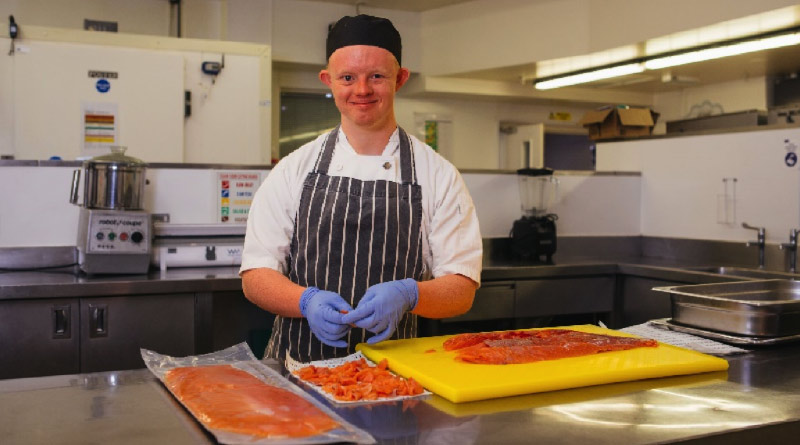Nearly Nine In 10 Adults With Learning Disabilities Struggle To Find Employment, Reveals Hilton Study

Almost nine in 10 (89%) people with a learning disability in the UK have experienced difficulties finding a job, a new survey commissioned by Hilton to mark Learning Disability Week has revealed.
With a fall in the employment rate of people with learning disabilities to under 5%1, the research uncovered that for the majority of individuals (79%), a fear of being judged at the interview stage had put them off applying for a role altogether.
Additionally, a lack of confidence (51%) and feeling that prospective employers do not understand what an individual could do with the right support (32%) were key challenges facing those with learning disabilities when looking for a job.
A quarter (25%) felt they didn’t receive enough support during the application process, and 27% worried that they might not have the right support to carry out their responsibilities once employed.
The challenge also extends to those that have successfully found employment, with 62% saying they found it difficult to keep their job – primarily because they felt the company was not equipped to support those with a learning disability (45%) and that they did not have the right support from their team (41%).
Challenges echoed by employers
To support those with learning disabilities looking to find employment, Hilton partners with the Down’s Syndrome Association’s WorkFit programme, which brings together employers and job-seekers who have Down’s Syndrome, supporting employers with resources, advice and training to provide employment opportunities, as well as Aurora Foxes, a specialist training college that provides training, work experience and employment opportunities to young adults with learning disabilities.
As part of the research, the hospitality company explored the barriers facing businesses when it comes to welcoming those with learning disabilities into their workforce.
The findings echoed similar challenges, with 60% admitting they don’t think UK companies are doing enough to be inclusive.
Employers highlighted a perceived lack of suitable roles (30%), not believing they have the right infrastructure in place to support those with a learning disability (26%) and concerns about the cost of additional training (21%) as the key barriers to recruitment.
Despite the challenges employers face, the research demonstrated the significant value of employing those with learning disabilities. The vast majority (89%) of employers who had hired someone with a learning disability confirmed that they met or exceeded expectations.
Businesses highlighted a significant increase in empathy amongst their teams (62%), stronger team bonds (48%) and an improved understanding about the value of a diverse workforce (45%) as some of the broader benefits of recruiting those with a learning disability.
More training and support needed for employers
Despite this, only 42% of businesses said they are likely to hire someone with a learning disability in the future.
Those with learning disabilities highlighted a real need for more training for fellow team members (39%) and managers (38%) to ensure employers are equipped to welcome individuals into their workforce. Employers echoed this sentiment, with nearly half (46%) saying they received no training on how to hire or manage someone with a learning disability, and 36% admitting they had no ongoing support in place once an individual is hired.
To help other businesses overcome the perceived challenges around employing someone with a learning disability, Hilton is launching an educational workshop in partnership with the Down’s Syndrome Association and Aurora Foxes. The free workshop will take place in early September, and businesses can register early interest here.
Stephen Cassidy, senior vice president and managing director, UK & Ireland at Hilton, said: “Building an inclusive workplace which allows every individual to thrive is fundamental to the success of any business. We’ve seen first-hand the benefits of supporting those with learning disabilities, welcoming some exceptional talent into our business in partnership with the Down’s Syndrome Association and Aurora Foxes. But this research shows there is a real opportunity to empower more businesses to embrace this wealth of talent. We hope that by sharing our experience, we can inspire other employers to provide much-needed job opportunities for those with learning disabilities and help them reap the benefits that a diverse workforce brings – from employee engagement to business performance.”
In support of its commitment to helping people with learning disabilities find fulfilling, paid employment, Hilton works with its partners to provide job opportunities, currently employing Team Members across functions including front office, kitchen, food & beverage and revenue management.
Shomari Burford, aged 24 from London, has Down’s Syndrome and began his career as a doorman through the WorkFit scheme in 2018, fast becoming an integral part of the guest-facing team. Thriving in his front-line job in one of the world’s busiest cities, he now works in concierge, ensuring guests have a seamless stay and supporting the hotel’s operations team. He’s loved by colleagues and guests alike for his warm and enthusiastic nature.
Shomari said: “I love working here! It’s great to see a lot of guests coming in and out the hotel, and I really enjoy helping them. That’s my favourite part of the job, as well as working with my team who have all been very supportive.”
Alison Thwaite, WorkFit employment development manager at Down’s Syndrome Association added: “The findings highlight the critical need for companies to prioritise training and support for decision-makers when it comes to welcoming people with learning disabilities into the workplace. As well as providing benefits for businesses, the power of employment for those with a learning disability cannot be underestimated. Finding work can help individuals increase their circle of friends, build self-esteem and confidence, increase independence and support both personal and professional development.”
